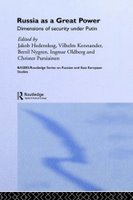 Everyone who has done it, knows how much works it takes to write or edit a book. As the editor with main day-to-day responsibility of Russia as a Great Power: Dimensions of Security under Putin (London: Routledge, 2005), I was happy and relieved to finalise a year's work on the volume, and getting it accepted for publication by Routledge. Little did I know that it would take another year for it to appear on the market. Being an anthology, with contributions by 14 different writers from 7 European countries, I was and still am very pleased that we succeeded in staying in line with the general theme of the book, viz. that of Russia as a Great Power foreign and security policy actor. Whether this is really the case is, however, up to the reader to judge.
Everyone who has done it, knows how much works it takes to write or edit a book. As the editor with main day-to-day responsibility of Russia as a Great Power: Dimensions of Security under Putin (London: Routledge, 2005), I was happy and relieved to finalise a year's work on the volume, and getting it accepted for publication by Routledge. Little did I know that it would take another year for it to appear on the market. Being an anthology, with contributions by 14 different writers from 7 European countries, I was and still am very pleased that we succeeded in staying in line with the general theme of the book, viz. that of Russia as a Great Power foreign and security policy actor. Whether this is really the case is, however, up to the reader to judge.The book covers four dimensions of Russian policy: external security, regional security, internal security, and terrorism.
After a period of relative weakness and instability during most of the 1990s, Russia is again appearing as a major security player in world politics. This book provides a comprehensive assessment of Russia's current security situation, addressing such questions as:
- What kind of player is Russia in the field of security?
- What is the essence of its security policy?
- What are the sources, capabilities and priorities of its security policy?
One important conclusion to emerge is that, while Russian foreign policy under Putin has become more pragmatic and responsive to both problems and opportunies, the growing lack of checks and balances in domestic politics makes political integration with the West difficult and gives the president great freedom in applying Russia's growing power abroad.



No comments:
Post a Comment